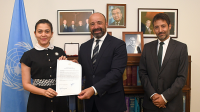Press Releases
Displaying 81 - 100 of 1739
Advanced Search
A joint assessment by the Government of Ukraine, the World Bank Group, the European Commission and the UN released in March 2023 estimated the cost of reconstruction and recovery at USD 411 billion. As the destruction of the war continues, UNECE is stepping up its support in preparation for…

Leaders from over 40 cities worldwide have reaffirmed the value of sharing experience, knowhow and partnerships as part of an inclusive multilateral process at the Third UNECE Forum of Mayors.
City representatives shared their experiences in finding urban regeneration solutions that…

On 4 October 2023, North Macedonia became the 28th country to join the UNECE-WHO/Europe Protocol on Water and Health, thus committing to drive action on water, sanitation and hygiene, protecting its natural resources and fostering a healthier environment for its citizens.
The Protocol…

UNECE supports cities of Almaty and Podgorica to become smarter and more sustainable
Faced with complex challenges of rapid urbanization, the cities of Almaty (Kazakhstan) and Podgorica (Montenegro) will benefit from new UNECE recommendations to help sharpen their efforts for smart and sustainable development. The Smart Sustainable City Profiles, presented today to the UNECE…

The 3rd Forum of Mayors will bring together some 50 city leaders from around the world at the United Nations in Geneva on 2-3 October to share practical experiences of urban regeneration, and to help harness cities’ unique role in addressing some of the key challenges of our time.
…

L'Envoyé Spécial du Secrétaire Général des Nations Unies pour la Sécurité Routière, M. Jean Todt, et Jean-Charles Decaux, Co-Directeur Général de JCDecaux, ont lancé aujourd'hui une nouvelle campagne mondiale des Nations Unies pour la Sécurité Routière afin de lutter contre les accidents de la…

El enviado especial del secretario general de las Naciones Unidas para la seguridad vial, Jean Todt, y Jean-Charles Decaux, co-director general de JCDecaux, han lanzado hoy una nueva campaña mundial de seguridad vial de las Naciones Unidas para hacer frente a los accidentes de tráfico, que son…

The United Nations Secretary-General's Special Envoy for Road Safety, Mr Jean Todt, and Jean-Charles Decaux, co-CEO of JCDecaux, launched today a new UN Global Road Safety campaign to address road traffic crashes, which are the leading cause of death for people aged 5 to 29 around the world. …

UNECE and partners to develop AI-powered platform to help build resilient energy systems
To meet the objectives of the Paris agreement, energy systems will need to undergo a profound transformation and become fully resilient, finding the right balance between the three pillars of resiliency (as defined in UNECE’s publication “Building Resilient Energy Systems”): energy security,…

A milestone for advancing sustainable resource management worldwide has been reached with the endorsement of the United Nations Resource Management System (UNRMS) by the United Nations Economic and Social Council (ECOSOC). UNRMS is a set of principles and requirements that guide the planning,…

The decrease of air pollution achieved since the 1990s thanks to measures adopted under the Air Convention is leading to ongoing biological recovery from acidification in freshwater environments in Europe. This is the main finding of a new report published in the framework of the International…

El enviado especial Jean Todt visitará Honduras (21-22 de agosto), El Salvador (23-24 de agosto), Brasil (26-29 de agosto) y Paraguay (30-31 de agosto) para reunirse con ministros y representantes de los sectores público y privado, así como con ONGs, a fin de abogar por la aplicación efectiva…

The Special Envoy Jean Todt will visit Honduras (August 21-22), El Salvador (August 23-24), Brazil (August 26-29), and Paraguay (August 30-31) to meet with ministers and representatives of the public and private sector and NGOs, to advocate for the effective implementation of the Global Plan for…

UN Secretary-General appoints Ms. Tatiana Molcean of Moldova as next Executive Secretary of UNECE
United Nations Secretary-General António Guterres announced on 26 July 2023 the appointment of Tatiana Molcean of Moldova as the next Executive Secretary of the United Nations Economic Commission for Europe (UNECE). She will succeed Olga Algayerova of Slovakia, to whom the Secretary-General is…

Forests and climate change: An Oscar-winning alliance - Michelle Yeoh on the UN Forest Podcast
The world is falling behind on lowering global carbon emissions. We only have a narrow chance of limiting global warming to 1.5°C above pre-industrial levels (Intergovernmental Panel on Climate Change Sixth Assessment Report) or as the United Nations Secretary-General says, “our world needs…

New United Nations survey highlights progress in global trade facilitation despite multiple crises
Persisting effects of the COVID-19 pandemic, geopolitical turbulence and high inflation continue to challenge international trade. Despite these global disruptions, countries are continuing to move towards a seamless and efficient trading environment by simplifying and digitalizing formalities…

The Gambia joins UN Water Convention to boost cross-border cooperation on its shared waters
The Gambia has taken a decisive step for cooperative water action by officially becoming the 52nd Party to the Convention on the Protection and Use of Transboundary Watercourses and International Lakes (known as the UN Water Convention) and 9th Party in Africa. The Gambia’s accession comes…

Each year, across the pan-European region, an estimated 1.4 million deaths are linked to environmental risk factors, including pollution and climate change. To accelerate collective commitments for healthier people and a sustainable future, Ministers and representatives of pan-European countries…

Forest work must be made safer and healthier, says new FAO-ILO-UNECE report
A systemic change is needed to provide a safe and healthy working environment for the estimated 33 million people working in the forest sector worldwide, according to a new report from the Food and Agriculture Organization of the United Nations (FAO), the International Labour Organization (ILO)…

Panamá: primer país latinoamericano en adherirse a la Convención del Agua de la ONU
Al convertirse en el primer país de América Latina que se adhiere a la Convención sobre la Protección y Utilización de los Cursos de Agua Transfronterizos y de los Lagos Internacionales (Convención del Agua), Panamá ha dado hoy un paso decisivo para apoyar el uso sostenible de los recursos…

